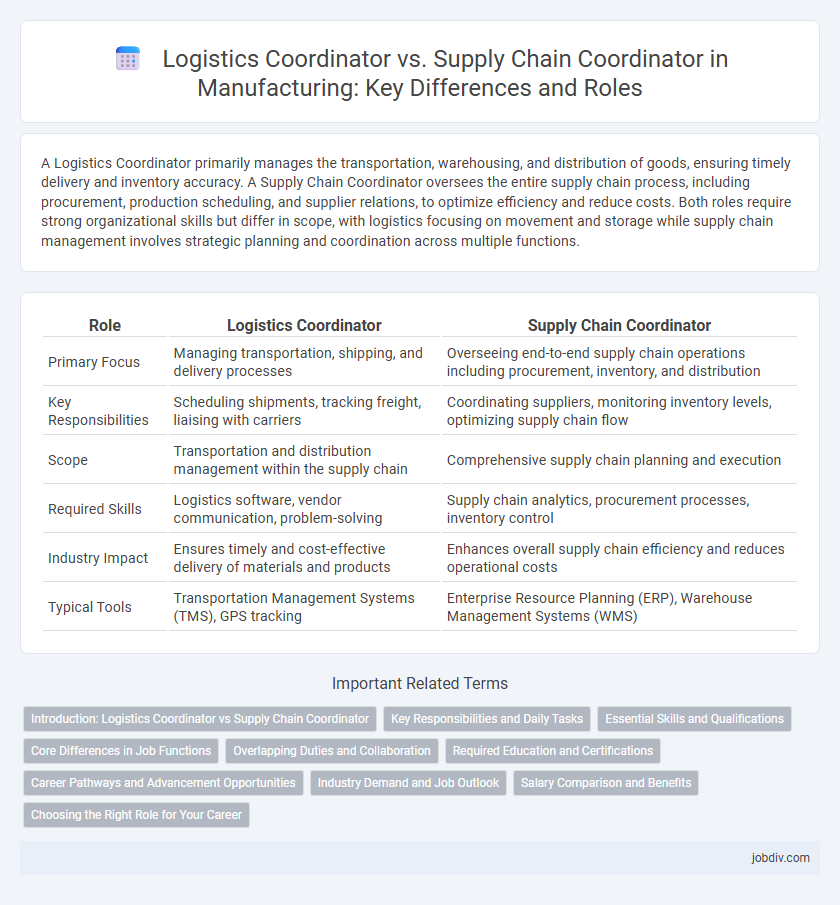A Logistics Coordinator primarily manages the transportation, warehousing, and distribution of goods, ensuring timely delivery and inventory accuracy. A Supply Chain Coordinator oversees the entire supply chain process, including procurement, production scheduling, and supplier relations, to optimize efficiency and reduce costs. Both roles require strong organizational skills but differ in scope, with logistics focusing on movement and storage while supply chain management involves strategic planning and coordination across multiple functions.
Table of Comparison
| Role | Logistics Coordinator | Supply Chain Coordinator |
|---|---|---|
| Primary Focus | Managing transportation, shipping, and delivery processes | Overseeing end-to-end supply chain operations including procurement, inventory, and distribution |
| Key Responsibilities | Scheduling shipments, tracking freight, liaising with carriers | Coordinating suppliers, monitoring inventory levels, optimizing supply chain flow |
| Scope | Transportation and distribution management within the supply chain | Comprehensive supply chain planning and execution |
| Required Skills | Logistics software, vendor communication, problem-solving | Supply chain analytics, procurement processes, inventory control |
| Industry Impact | Ensures timely and cost-effective delivery of materials and products | Enhances overall supply chain efficiency and reduces operational costs |
| Typical Tools | Transportation Management Systems (TMS), GPS tracking | Enterprise Resource Planning (ERP), Warehouse Management Systems (WMS) |
Introduction: Logistics Coordinator vs Supply Chain Coordinator
A Logistics Coordinator manages the day-to-day transportation, warehousing, and distribution of materials within the manufacturing process, ensuring timely delivery and efficient inventory handling. A Supply Chain Coordinator oversees the broader supply chain operations, including procurement, supplier relations, production scheduling, and demand forecasting to optimize the end-to-end flow of goods. Both roles are crucial in manufacturing but differ in scope, with Logistics Coordinators focusing on execution and Supply Chain Coordinators emphasizing strategic coordination.
Key Responsibilities and Daily Tasks
A Logistics Coordinator manages the movement and storage of raw materials and finished goods, ensuring timely delivery, coordinating with carriers, and tracking shipments to optimize transportation routes. A Supply Chain Coordinator oversees procurement, inventory levels, and supplier relationships, focusing on demand forecasting, order processing, and coordinating production schedules to maintain workflow efficiency. Both roles require strong communication skills and data analysis but differ in scope, with Logistics Coordinators emphasizing distribution logistics and Supply Chain Coordinators managing end-to-end supply processes.
Essential Skills and Qualifications
Logistics Coordinators require expertise in transportation management, inventory control, and route optimization to ensure timely delivery and cost-efficiency. Supply Chain Coordinators must demonstrate strong analytical skills, demand forecasting abilities, and proficiency in procurement processes to optimize end-to-end supply chain performance. Both roles benefit from excellent communication, problem-solving skills, and familiarity with ERP and WMS software platforms.
Core Differences in Job Functions
Logistics Coordinators primarily manage the transportation, warehousing, and delivery processes to ensure timely movement of goods across the supply chain. Supply Chain Coordinators oversee broader activities including procurement, inventory management, and supplier relationships to optimize the entire supply chain flow from raw materials to finished products. The core difference lies in Logistics Coordinators focusing on operational execution, while Supply Chain Coordinators emphasize strategic planning and coordination across multiple supply chain components.
Overlapping Duties and Collaboration
Logistics Coordinators and Supply Chain Coordinators share overlapping duties such as managing inventory levels, coordinating shipment schedules, and ensuring timely delivery of materials within manufacturing operations. Both roles collaborate closely to optimize the flow of raw materials and finished goods, streamline communication between suppliers, production teams, and distribution channels. Effective teamwork between logistics and supply chain coordinators enhances operational efficiency, reduces lead times, and supports just-in-time manufacturing processes.
Required Education and Certifications
A Logistics Coordinator typically requires a high school diploma or associate degree, with certifications like Certified Logistics Associate (CLA) or Certified Logistics Technician (CLT) preferred to demonstrate expertise in transportation and warehouse management. A Supply Chain Coordinator often needs a bachelor's degree in supply chain management, business administration, or industrial engineering, with certifications such as Certified Supply Chain Professional (CSCP) or APICS Certified in Production and Inventory Management (CPIM) enhancing qualifications. Both roles benefit from hands-on experience in logistics software and inventory control, but supply chain positions emphasize strategic planning and cross-functional coordination.
Career Pathways and Advancement Opportunities
Logistics Coordinators typically manage the transportation and distribution of goods, focusing on shipment scheduling and cost optimization, which builds expertise in operational efficiency and vendor negotiations. Supply Chain Coordinators oversee the end-to-end supply chain processes, including procurement, inventory management, and demand forecasting, developing skills essential for strategic planning and cross-departmental collaboration. Career advancement for Logistics Coordinators often leads to roles in logistics management or transportation director positions, while Supply Chain Coordinators progress toward supply chain management, procurement leadership, or operations director roles, emphasizing broader strategic responsibilities.
Industry Demand and Job Outlook
The demand for Logistics Coordinators and Supply Chain Coordinators in manufacturing continues to grow as companies prioritize efficient inventory management and distribution networks. Industry data from the Bureau of Labor Statistics projects a 10% job growth for logistics roles and an 8% increase for supply chain positions over the next decade. Organizations seek candidates with expertise in demand forecasting, transportation planning, and supplier relationship management to optimize manufacturing supply chains.
Salary Comparison and Benefits
Logistics Coordinators in manufacturing typically earn an average annual salary ranging from $45,000 to $65,000, focusing on the management of transportation and warehouse activities. Supply Chain Coordinators receive slightly higher compensation, averaging between $50,000 and $70,000, due to their broader role in overseeing procurement, inventory management, and supplier relations. Benefits for both positions often include health insurance, retirement plans, and performance bonuses, with Supply Chain Coordinators frequently gaining additional perks like professional development opportunities and travel allowances.
Choosing the Right Role for Your Career
Choosing between a Logistics Coordinator and a Supply Chain Coordinator depends on your career goals and skill set. Logistics Coordinators specialize in managing transportation, warehousing, and distribution processes, ensuring timely delivery of goods. Supply Chain Coordinators focus on end-to-end supply chain management, including procurement, inventory control, and supplier relationships, offering a broader strategic perspective within manufacturing operations.
Logistics Coordinator vs Supply Chain Coordinator Infographic

 jobdiv.com
jobdiv.com